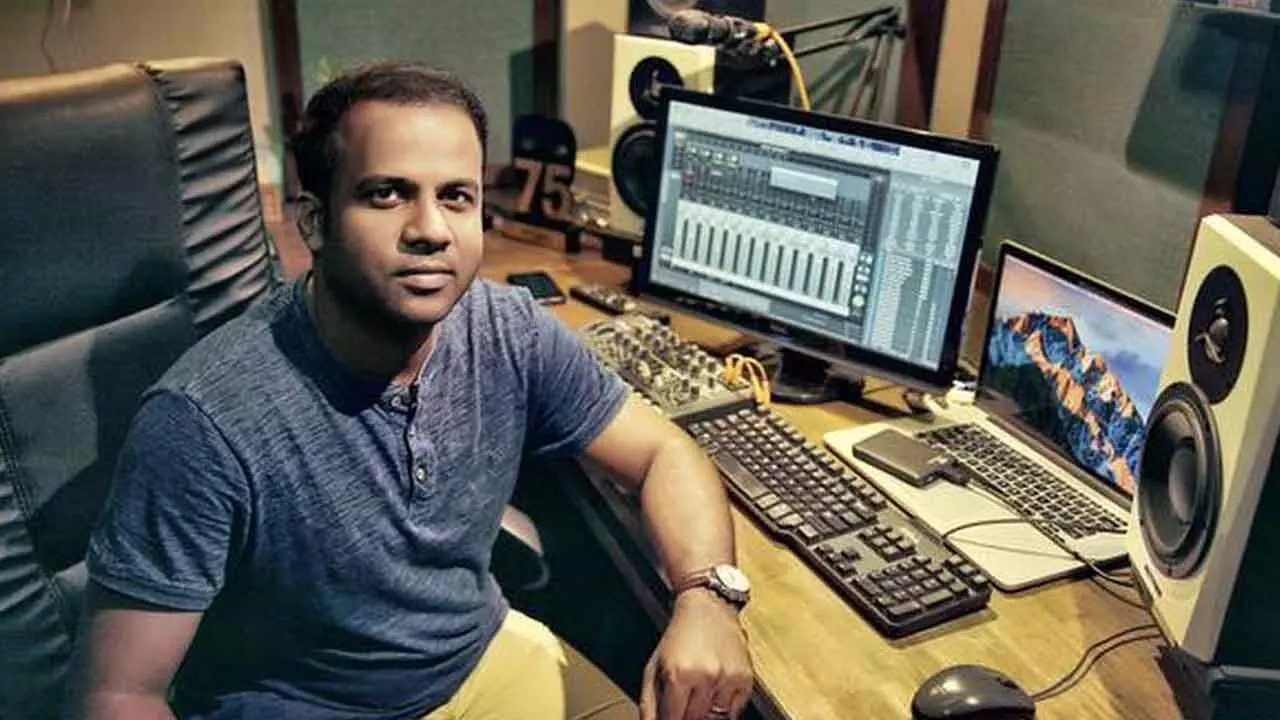Live
- No country in world matches India's zeal for knowledge: Yogi
- Special trains for Ayyappa devotees
- Didn’t expect win margin to be so huge: BJP’s Ramveer
- Am I Pregnant? Symptoms to look out for
- iOS 19 and LLM Siri Delayed Until April 2026: What to Expect
- NGO brings hearing impaired youth into professional path
- Mass Kolatam at SVU enters Wonder Book of Records
- Koil Alwar Thirumanjanam on Nov 26
- 16 gold medals, 485 degrees awarded to students
- TBS held Karthika Vana Mahotsav
Just In
You'll never starve in India if you have some talent: Jakes Bejoy


Jakes Bejoy, who achieved massive success for Saripodhaa Sanivaaram, boasts a fascinating discography including Ayyappanum Koshiyum, Pakka Commercial,...
Jakes Bejoy, who achieved massive success for Saripodhaa Sanivaaram, boasts a fascinating discography including Ayyappanum Koshiyum, Pakka Commercial, and the upcoming Mechanic Rocky. He recently shared insights into his energetic career journey with The Hans India.
Q:Classical or Western? What would you deem is your forte?
A: A composer should have knowledge across all genres, though not necessarily be an expert. Whether it's classical, Western, or R&B, you need to adapt based on the movie. I consider myself a general-purpose musician, and this versatility applies across all industries be it Malayalam, Telugu, or Tamil. Earlier, there were clear distinctions between these industries, but now everything has blended. I particularly love the energy here. In Malayalam, my music can sometimes feel too much, but in Telugu, whatever I deliver, both the film and audience embrace it.
Q: With a background in Stanford and Disney, why did you return to India instead of aspiring to Hollywood?
A: It's tough out there, especially in Hollywood. I tried for Hollywood before joining Disney, but the industry there is different. Here, even a small technician can survive— for a short film, you can earn ₹50,000 to ₹1 lakh. In the U.S., unless you’re an A-list or B-list composer, you're paid peanuts, maybe $50 to $100. It was difficult for me as an outsider and an Indian student. I assisted people in Los Angeles for three months, but they didn’t pay me a stipend, nothing. Here in India, a musician can survive 100%. You don't starve in India. You can work in programming, composing, or even in Kerala’s film industry. After joining Disney as an audio programmer, I realised it wasn’t for me—movies have always been my passion. My friends in the industry reached out, and I took a six-month sabbatical, never returning to Disney. Once the movie bug bites, there’s no turning back—it’s a very addictive industry.
Q: What are your goals moving forward?
A: Independent music is growing, especially in Malayalam and Tamil, though not as much in Telugu. Big producers dominate now, and smaller musicians are looking for opportunities in the independent scene. I find this space beautiful and want to explore it. While I have my preferences, in films, I have to follow the director's vision. Independent music gives me more creative freedom, and our production house has already produced Kumari with Aishwarya Lakshmi. We develop scripts, find investors, and there’s minimal creative compromise. That’s something I want to continue doing.
Q: How do you approach composing for Telugu versus Malayalam films? Is there a difference?
A: It all depends on the content. For example, I'm working on Identity with Tovino Thomas, which is an espionage thriller. This genre doesn’t call for mass beats. If Identity were a Telugu film with Nani, I would still approach it the same way. There’s no difference; it’s the content that drives the music. Over the past decade, the barriers between languages in music have dissolved—concept and content guide the composition.
Q: How do you decide if the heavy percussion, orchestration, or electronic effects in your tracks are enough?
A: It all depends on the scene and the director’s vision. When you see the film, you gauge how much percussion or electronic mixing is needed. For example, trumpets on a keyboard won’t give the right punch, so we blend live orchestra and live trumpets. It’s a call we make based on the scene and the desired effect. For high-energy moments, like when Nani emerges from smoke, there’s no compromise—everything from percussion to horns is included. You have to feel the energy from the director and the audience. There’s no such thing as “enough”—it’s all about finding the right balance. I never go overboard and always rely on my sensibilities to guide me.

© 2024 Hyderabad Media House Limited/The Hans India. All rights reserved. Powered by hocalwire.com






